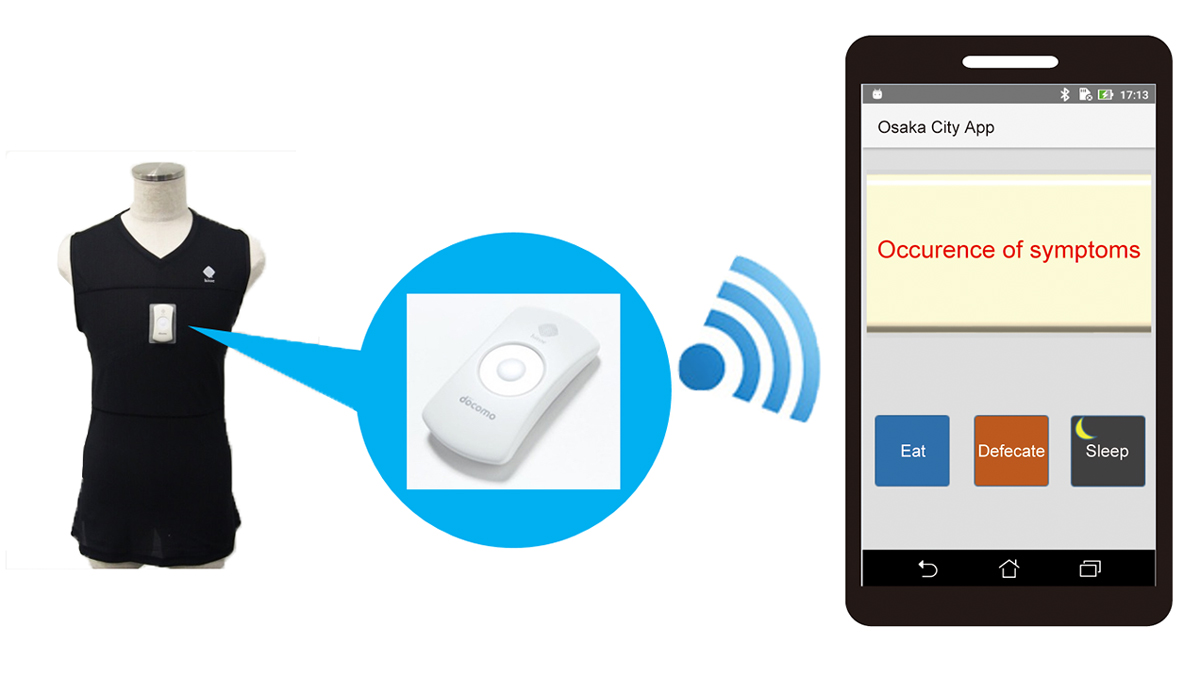Research News
Jan 12, 2023
Realtime monitoring with a wearable device reveals IBS-related changes
Sympathetic nervous system, involved in pathogenesis, active pre- and post-defecation

Heart rate variability was measured using a wearable device, a sleeveless shirt with a transmitter. Heart rate variability was recorded on a smartphone using Bluetooth, while activities such as bowel movements and sleeping were tracked using an independently developed smartphone application.
Irritable bowel syndrome (IBS) is a difficult disease to treat, characterized by chronic abdominal pain related to bowel movements, of which there are four types: diarrheal, constipation, mixed, and unclassifiable. Patients with IBS report a reduction in quality of life and experiences of social discomfort, as they are forced to restrict their activity, such as work or travel, because of the sudden and unpredictable need to use the bathroom. While there have been studies of IBS-related abnormalities in the autonomic nervous system based on 24-hour electrocardiogram measurement, until now none of them examined changes in the autonomic nervous system during bowel movements.
Associate Professor Fumio Tanaka and his research group at the Osaka Metropolitan University Graduate School of Medicine recorded the autonomic nervous system activity of IBS patients and healthy subjects using a wearable device and tracked activities such as defecation and sleep. As a result, they found that unlike healthy subjects, the sympathetic nervous system of IBS patients was activated 2 minutes before defecation and persisted until 9 minutes after defecation. Furthermore, the activation of the sympathetic nervous system was found to be associated with greater abdominal pain and lower quality of life. The research results were published online in PLOS ONE on December 9, 2022.
“This research is characterized by the fact that autonomic nervous system functions are measured using a clothing-type wearable device, and that lifestyle events such as defecation and abdominal symptoms are input simultaneously in real time, using a smartphone application originally developed by our group. As a result, autonomic nervous system activity during defecation was accurately evaluated. We hope that further research will improve the quality of life of IBS patients and help elucidate the pathophysiology,” Professor Tanaka concluded.
Funding
This study was supported by research funding from the Wellness Open Living Lab, LLC.
Paper Information
Journal: PLOS ONE
Title: Analysis of autonomic function during natural defecation in patients with irritable bowel syndrome using real time recording with a wearable device
DOI: 10.1371/journal.pone.0278922
Author: Rieko Nakata, Fumio Tanaka, Noriaki Sugawara, Yuichi Kojima, Toshihisa,Takeuchi, Masatsugu Shiba, Kazuhide Higuchi, Yasuhiro Fujiwara
Publish: December 9, 2022
https://doi.org/10.1371/journal.pone.0278922
Contact
Graduate School of Medicine
Fumio Tanaka
E-mail: tanaka.f[at]omu.ac.jp
*Please change [at] to @.
SDGs
